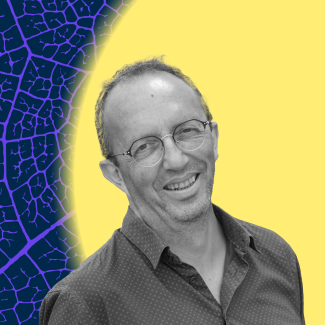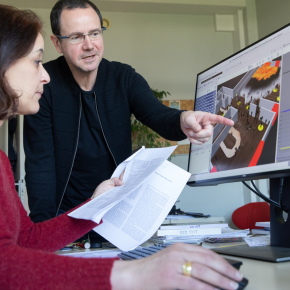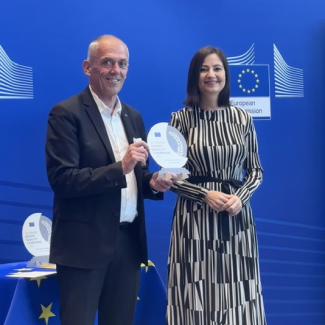
The AISSAI centre - at the crossroads of science and AI
Bringing all the scientific disciplines involved in AI together in dialogue is is the stated ambition of the 'AI for Science, Science for AI' Centre (AISSAI). This centre is a response to one of the CNRS's six major societal challenges.
"Among the six challenges the CNRS listed in its 2019-2023 Objectives and Performance Contract [COP], artificial intelligence [AI] was listed as both a societal challenge and a scientific priority in the digital field", explains Jalal Fadili, scientific officer at the Institute for Information Sciences and their Interactions (INS2I) and director of the AI for Science, Science for AI centre (AISSAI) since it was set up in November 2021. According to its director, the AISSAI centre aims to "spearhead CNRS responses to the multidisciplinary scientific challenges linked to AI".
AI impacts all scientific disciplines
The proliferation of scientific programmes working on AI can be explained by the upheavals AI is creating worldwide in every field including health, innovation and, of course, research. Clearly then, AI is obviously a priority for the CNRS given its unique scientific coverage spectrum. Jalal Fadili points out that "AI has become a disruptive means of conducting science and accelerating scientific discovery as it is transforming scientific methods, transcending disciplinary boundaries and bringing out new interdisciplinary approaches". As a result, AI methods are now being very quickly rolled out throughout the CNRS in the major research infrastructures and national and international experimental platforms the organisation leads, manages or contributes to. All disciplines are concerned, from biology with the Flagship Human Brain platform to high-energy physics with the example of the Large Hadron Collider and including the study of biodiversity with the Pôle National de Données de Biodiversité. The AISSAI centre is an integral part of this highly diversified scientific landscape and has the specific distinctive feature of bringing together all the scientific disciplines to work on AI.
Until now AISSAI has been a 'centre without walls' and has worked on implementing a number of varied approaches to bring together scientists from different fields. These include launching three- to four-month interdisciplinary thematic programmes with 'AI and statistical physics' being the focus last year, 'Causality' as this year's subject and 'AI and digital humanities' and 'AI and particle physics' for 2024. It is also launching an international fellows1 programme with an international call that its director considers will "sow the seeds of future scientific collaborations" following visits to French laboratories by international colleagues. Other activities the centre has been working on include hosting multidisciplinary teams, organising 'hackathon' events and challenges focused on scientific data and other outreach events for the general public.
After over a year of existence, the centre's importance is now nationally and internationally recognised. In France, "since AISSAI is a CNRS structure", explains Jalal Fadili, "it was naturally jointly constructed with representatives of the 10 CNRS Institutes who themselves all come from joint research units" which means the centre is in constant dialogue with all the scientific stakeholders involved in AI research. On the international level, the AISSAI centre possesses a very high-level international scientific committee and has attracted the interest of the centre IVADO in Quebec2 , one of whose projects (involving AISSAI) was a winner in the Canada First Research Excellence Fund competition3 Following the director of the IVADO Centre's visit to the CNRS in May 2023, this collaborative initiative has produced a roadmap that sets out a programme for cooperation over several years.
Original scientific positioning
This closeness of the two centres can partly be explained by their original scientific positioning. This is a highly competitive field in which governments and scientific institutions vie for colossal budgets and the CNRS has chosen a sector that had been the subject of less focus until now – dialogues about AI between scientific disciplines. Jalal Fadili very clearly explains AISSAI's ambition: "We are neither a research organisation nor a university. Our aim is to bring people together to talk to each other and to promote international scientific exchanges between AI and science at the highest level ".
Jalal Fadili has a clear model in mind to achieve this objective - the institut Henri-Poincaré4
, (IHP) a support and research unit (UAR) recognised throughout the international mathematics community for the quality of its scientific leadership since its creation in 1928. Like the IHP, AISSAI will become a UAR with its own budget and staff on January 1st 2024 under the joint supervisory authority of the INS2I and the National Institute for Mathematical Sciences (INSMI).
As Jalal Fadili notes, the global importance of the study of the relationships between AI and other scientific disciplines has been continually increasing since 2019 when the CNRS defined it as one of its six societal challenges in its COP for the 2019-2023 period. The AISSAI centre is part of the CNRS which means it has a uniquely panoramic view of all the sciences and can reach out to disciplines that scientists working on AI might not initially think of. The director of the AISSAI centre considers it essential to make the most of the CNRS's multidisciplinary scope in a sector in which international competition is rife: "It's time now to accelerate and change scale if we want to achieve our ambition of becoming an IHP for AI".
.
- 1This call invites researchers, particularly those from academic institutions in other country, to submit individual research projects to be carried out during a 12 or 24 month stay in a CNRS laboratory in the framework of the AISSAI national centre.
- 2IVADO is a consortium for research, training and knowledge in the field of artificial intelligence. It generates, drives and supports artificial intelligence (AI) initiatives by federating the research community, organisations and institutions in this field.
- 3The Canada First Research Excellence Fund (the 'Apogee' Fund) aims to strengthen the existing strong points of Canadian postsecondary institutions so they can excel globally in research areas that create long-term economic advantages for Canada. Through a highly competitive peer review process the Fund invests approximately $200 million per year to support the selected Canadian postsecondary institutions in turning their key strengths into world-leading capabilities.
- 4IHP, CNRS/Sorbonne University
The COP's six societal challenges
In the COP 2019-2023 the CNRS set out six challenges facing today's society that the organisation wishes to decisively respond to in the coming years through the coordinated mobilisation of its ten Institutes. These are complex challenges that were revealed by or are driven by science like climate change and artificial intelligence or alternatively that can benefit from science's input like the energy transition. The CNRS Scientific Office (DGDS) coordinated an inter-Institute dialogue which enabled dedicated working groups to identify CNRS laboratories' existing actions and projects involving the six selected societal challenges.
The six challenges:
- Climate change
- Educational inequalities
- Artificial intelligence
- Health and environment
- Territories of the future
- Energy transition


